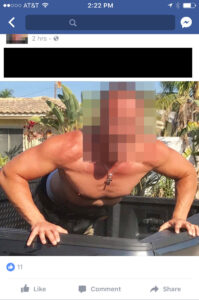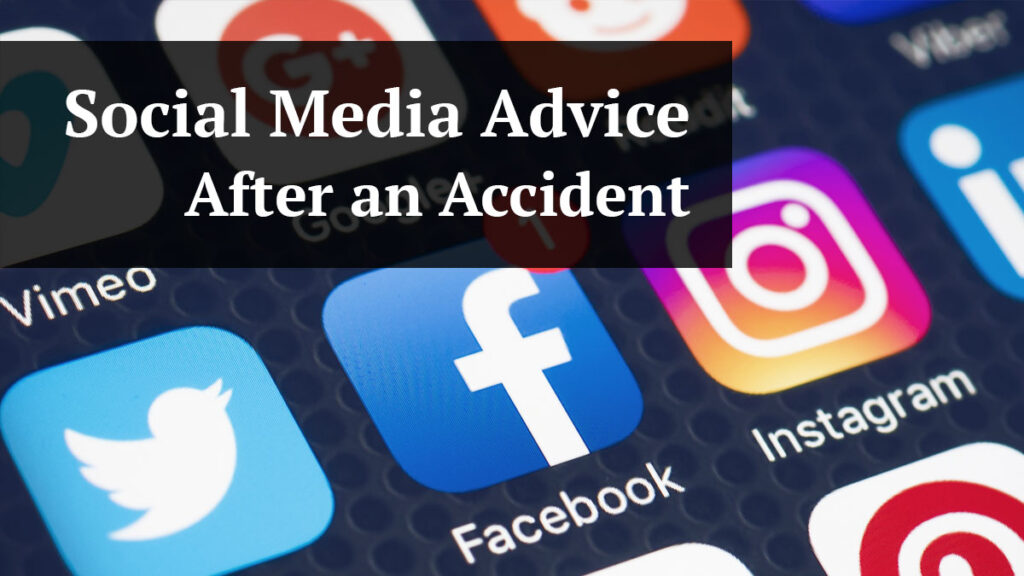Your use of social media after an injury accident can make a big difference with your case. Even having friends post on your page or tag you in pictures can come back to bite you. After years of hearing insurance adjusters and defense lawyers use my clients’ social media accounts against them, I decided to write this article. The following will discuss the Do’s and Don’ts following an accident when you have a possible injury claim. And, don’t worry, you don’t have to delete your accounts-you just have to use common sense and be careful.
What not to post on Social Media during an ongoing personal injury claim

While my client was rehabbing his back injury, he posted this shirtless photo of himself doing pushups in the bed of his truck. Needless to say, that case did not go over well. This was an easy example, but you would be surprised about how situations are manipulated and spun against people. It is always better to not be in the position of having to explain.
Table of Contents
Steps to Take Immediately After the Accident
The first thing to do after the accident is to make sure that your social media settings are set to private. You will have to specifically look for this setting. If you do not limit public access, this will allow the insurance company and their investigators to view everything on your account. You cannot allow them to do this.
Second, make sure that you or your friends do not comment or say anything about getting a lawyer, suing, or getting paid, money, etc. Any words to this effect looks terrible and I guarantee it will be used against you in the case. I have even had to drop a case after my client’s son bragged about how they were going to get a lot of money from the accident. He started doing this while his mom was in the ambulance on the way to the hospital! Never make it look like your motivation is money rather than getting compensation for a legitimate injury after an accident. My experience is that these posts happen immediately after the accident and are normally from someone else. Even a comment from your friend that you do not respond to needs to be removed. If any of this happens, immediately delete what was said.
What Can You Post During the Case?
My best advice as far as what you can post is to use common sense. There is no need for you to post selfies while you have a claim pending. Always consider what the post will look like to the other side. Think about how it will look to a jury. Photos are strong evidence of the extent of your injuries and how it has affected your life. Here are some examples: pictures of exercise, biking, kayaking, hiking, jogging, and vacations. I don’t think I need to discuss why pictures of physical activity are counterproductive to a personal injury claim, but vacations may surprise you. The reason why vacations are looked at negatively are because they are a big quality of life indicator. The argument goes that if you are able to vacation, you are still able to enjoy life and can’t be that badly injured.
Perhaps the biggest example of posts that are spun against people by the insurance companies deal with photos of people out at dinner. You would be shocked at how similar photos of people before and after the accident look. A person could be in 10/10 pain and still look good in a photo. People don’t post pictures of themselves looking bad, right? So, if you are out to dinner having drinks with family and friends, you will normally post or perhaps get tagged in a photo with everyone smiling and having drinks. You might even use a filter or an angle that makes you look good, right? When the insurance company takes those photos and compares them to your photos pre-accident, they typically look the same. They make it look like nothing has changed in your life-that you are happy, smiling, and having a good time. Most people would not realize that these photos are a problem, which is why I am bringing it up here.
Other Examples of Damaging Content
Social media after an injury is not just limited to vacations and dinners with friends. Here is a list of other types of posts that have been used against my clients:
I once had a client involved in a serious rear-end car accident. He had neck injuries and we were asking for a lot of money. During his deposition, they asked him about if he was drinking the night of the incident and he said no. He volunteered that he does not drink and went into this big spiel about how he had family members with alcohol problems and that is why he doesn’t drink. I didn’t think anything else of it. At mediation, they brought out at least 10 photos off his Facebook account of him holding shots, beers, doing toasts, you name it. They took the position that because he lied about the drinking, he must have lied about the injuries. I spoke to my client and he explained that because he worked in the bar business, it seemed odd that he doesn’t drink. So, when people bought him a drink, he did a post of him holding it and then put it down and never drank it. I believed him, but having to explain that did not look good and it definitely cost him money.
We also had a case where a woman injured her hand in a car accident. She then posted a photo of herself at a gun range holding a gun. Of course, the insurance adjuster found it and made a big deal out of it. The client explained that she never actually fired the gun, but still, it killed the case. The optics were such that we couldn’t get around it.
Lastly, we had a case with a young woman who had neck and back injuries. She went out to a karaoke bar with her friends and after a few drinks got up on stage. The rest was history…and so was her case.
Facebook and Instagram Are the Problems
No one posts about their injury accident on platforms like LinkedIn, so that’s not an issue. And, SnapChat videos aren’t around long enough to be captured. It has been my experience that the two main platforms where my clients get into trouble are on Facebook and Instagram. So, if you have these accounts, please take the above precautions. There is no need to live your life in a bubble, just try not to give the insurance companies any ammunition to use against you. Just assume that the insurance companies, their adjusters, and their lawyers will try to manipulate and/or spin against you anything that you voluntarily put out there for them to see.














